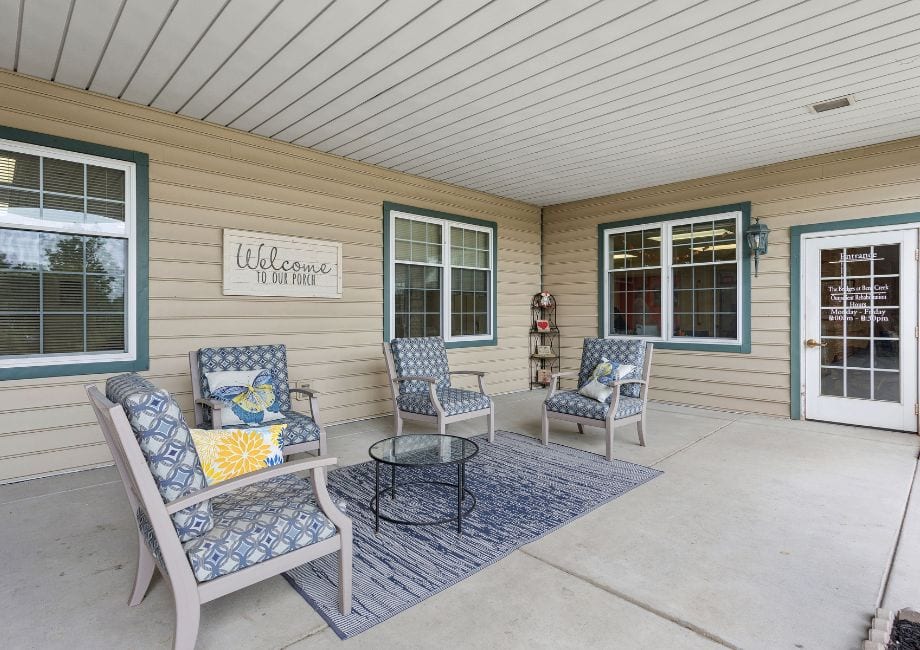When caring for an aging loved one, few decisions carry as much emotional weight as determining the right time to transition from personal care to memory care. While both lifestyles offer support and a sense of community, memory care provides a safer, more structured environment for those experiencing dementia or cognitive decline.
This shift is often needed when memory loss, changes in behavior, or increased difficulty with daily tasks begin to affect a loved one’s safety or well-being. Understanding these signs can help families make informed, compassionate choices and prepare for a smoother transition.
The Difference Between Personal Care & Memory Care
Both personal care and memory care support older adults with their daily routines, but each is designed to meet very different needs.
What Personal Care Offers
Personal care supports residents who need some assistance with daily living activities like bathing, dressing, or medication reminders. The goal is to promote independence and dignity while offering a welcoming community environment.
Residents often live in private suites and have the flexibility to participate in a wide range of shared experiences, dining, and wellness-focused programming. It’s a lifestyle that supports aging with grace, but it may not be suitable for those with increasing cognitive challenges.
What Makes Memory Care Different
Memory care is designed specifically for individuals living with Alzheimer’s or other forms of dementia. The focus here is not just physical safety, but also cognitive engagement and emotional comfort.
Staff in memory care communities receive specialized training to address the unique needs of those with memory loss. Residents benefit from structured routines, secure environments, and tailored therapies that support brain health and reduce confusion, anxiety, or wandering.
Recognizing It’s Time for Memory Care
Dementia doesn’t look the same for everyone. However, there are certain patterns and behaviours that often suggest someone’s care needs are no longer fully met within a personal care setting.
Noticeable Changes in Memory & Orientation
Mild forgetfulness is a natural part of aging, but persistent disorientation, repeating questions, or forgetting familiar people and routines could point to something more serious. If your loved one is getting lost in familiar places or increasingly confused, memory care may provide the appropriate support.
Struggles With Activities of Daily Living (ADLs)
If you notice a decline in basic self-care—like managing personal hygiene, preparing meals, or remembering medications—it may be time to re-evaluate the level of care provided. Memory care environments offer greater support for these day-to-day needs in a way that respects the resident’s dignity.
Increased Anxiety, Mood Swings, or Wandering
Emotional and behavioural changes can also signal that a move to memory care is needed. This includes increased irritability, agitation, or fear, especially in the evenings. Wandering or attempting to leave the community unsafely is another red flag that should not be ignored.

Supporting the Transition With Empathy & Planning
Even when it’s the right choice, the transition from personal care to memory care can be emotional for everyone involved. Being prepared and empathetic can ease the process.
Involve Your Loved One When Possible
Including your loved one in discussions can help them feel more in control. Ask about their preferences, fears, and what might make them feel more comfortable. Even small choices—like choosing decor or a favorite blanket to bring—can go a long way in creating a sense of familiarity.
Be Transparent and Reassuring
Open conversations, framed with patience and empathy, can build trust and reduce anxiety. Use language that emphasizes comfort, safety, and continued connection—not phrases that suggest giving something up.
Why an Early Transition Can Be Beneficial
Choosing memory care sooner rather than later can help reduce the distress that often comes with advanced cognitive decline. Waiting too long may limit the benefits that structured programming and tailored support can offer.
Benefits of Early Memory Care Support
- Cognitive stimulation: Our program includes activities that may help slow progression and keep the mind engaged longer.
- Structured routines: Consistency and predictability can reduce anxiety and increase comfort.
- Safety and security: Residents are protected from potentially new dangers like wandering or forgetting crucial tasks.
- Community and connection: Socialization within a memory care community can reduce feelings of isolation and confusion.
By making this transition early, residents have time to adjust and form meaningful relationships in their new environment.
Questions to Ask When Considering Memory Care
When evaluating whether a move is needed, consider the following questions:
- Are your loved one’s current care needs being met consistently and safely?
- Have they shown increased confusion, forgetfulness, or behavioral changes?
- Are they frequently anxious, agitated, or withdrawing from others?
- Has there been a recent medical diagnosis such as Alzheimer’s or another form of dementia?
- Does their current community have the resources and structure to support cognitive decline?
Steps to Prepare for the Move
Once the decision is made, preparing thoughtfully can make the transition smoother.
Create a Familiar, Comfortable Space
Bring familiar items from your loved one’s current living space into their new memory care suite. Items like photo albums, cherished décor, and favorite books can offer comfort and reduce disorientation.
Communicate With the Care Team
Caregivers benefit from knowing your loved one’s habits, preferences, and history. Share details like what time they prefer to wake up, how they enjoy spending time, or what soothes them when they’re upset. This allows the team to tailor support in a personal, respectful way.
Stay Connected & Involved
Frequent visits, phone calls, or participating in community events can help your loved one feel supported. While it may take time to adjust, consistent contact shows that their sense of connection hasn’t been lost—just relocated.
Finding Peace of Mind Through the Right Support
For those living in or near Mechanicsburg, choosing a senior living community that offers both personal care and memory care brings added peace of mind. It allows residents to age in place while receiving the appropriate support as their needs evolve.
At Lilac Trace Memory Care, we follow the “Meet Me Where I Am” philosophy, providing compassionate support for individuals with dementia or Alzheimer’s. Our team respects each resident’s personal history, communicates with empathy, and focuses on making each moment meaningful.
Backed by our R.E.A.C.H. for Life engagement program, Lilac Trace offers a supportive, structured environment where residents feel seen, safe, and valued.
Schedule a visit to The Bridges at Bent Creek to see how our warm, welcoming community supports residents through every stage of their journey.










